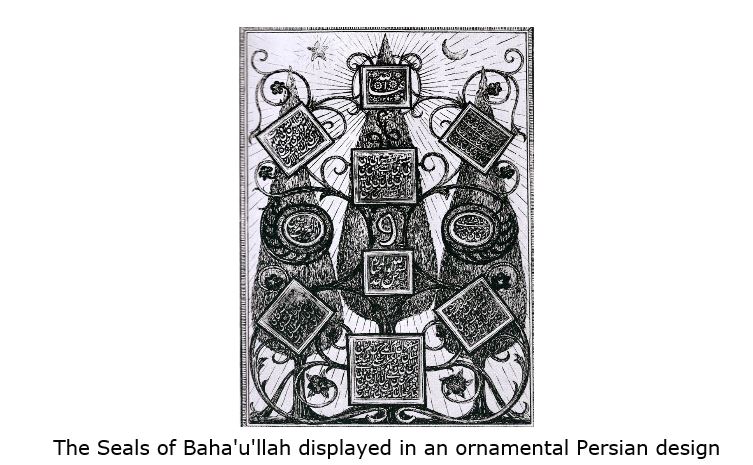
Some largely western writings, recollections and translations of materials about the life, companions and writings of Mirza Husayn `Ali Nuri, Baha'-Allah (b. Tehran 1817-d. Bahji, near Acre [`Akka'] May 29th 1892) mostly based on Persian and Arabic sources.
Stephen Lambden UCMerced.
In progress - last updated 25 th April 2015.
There are many thousands of documents that directly or indirectly pertain to the person of the founder of the Baha'i religion, Mirza Husayn `Ali Nuri, Baha'-Allah (b. Tehran 1817-d. Bahji, near Acre [`Akka'] May 29th 1892). They were either written by himself, by his relatives and followers, or by other persons who had something to say about him. Some relevant materials were written by persons who challenged his religious claims. Many, directly or indirectly had something to say about him or about his cultural or religious environment. Only a limited amout of this material about Baha'-Allah has been published in western languages. Most published materials say more about his writings and followers than about his person though the vast amount of biographically related data has yet to be adequately collected together, translated and analyzed or put into historical and theological contexts.
As a repeated prisioner and an exile, it was not always wise or safe for him to be publicly accessible. He lived in Qajar Persia (1817-1853) then for the next forty years in certain regions within the Ottoman Empire; in Ottoman Iraq (Baghdad, etc 1852-1863),Turkey, including the then capital Constantinople-Istanbul (1863), Adrianople-Edirne (1863-1868) and finally `Akka-Acre (and surrounding localities such as Bahji and on occasion Haifa) Palestine (1868-1892). The histories of the houses, towns and countries (along with their diverse populations and inhabitants, etc) where Baha'-Allah resided during the 19th century has yet to be written so as to throw light upon his life, writings and followers. A few of the works listed below will contain materials expressive of western sometimes hagiographical perceptions of the person. circumstances or environment of Baha'u'llah.

`Abd al-Baha'-`Abbas Effendi (1844-1921), eldest son of Baha'-Allah and his religious successor.
There are many thousands of Persian and Arabic letters or alwah (Tablets) as well as talks or discourses of `Abd al-Baha' which contain materials pertinent to the life of his father, the founder of the Baha'i Faith or Religion. A small proportion of them have been translated into English and/or other languages.
- Maqāla-yi shakhṣ-ī sayyāḥ ("A Travellers Narrative"), ed. and trans. Edward G. Browne (d.1926), as A Traveller’s Narrative, 2 vols. Cambridge: Cambridge University Press, 1891.
- Memorials of the Faithful. Translated and annotated by Marzieh Gail
Wilmette, Illinois " Baha'i Publishing Trust. 1971. - Some Answered Questions. Collected and translated by Laura Clifford Barney. London, Baha'i Publishing Trust, 1961 .
Atrpet, Sargis Mubagajian (1860-1937), an Armenian of Alexandropol who wrote in Russian and Armenian. See Browne, Materials pp. 176-7.
- Imamatʻ : patmakan hetaghōtutʻiwn. Aleksʻandrapōl : Tparan "Shirak" 1906 = lmamat: the Country of the Worshippers of the Imams (Persian clergy), Armenian version 1906
- Babizm i Bekhaizm : opyt nauchno-religīoznago izsli︠e︡dovanīi︠a︡ Tiflis : Ėlektropech. N.G. Agani’a‘nt’s︡, 1910.
- Russian version Alexandropol 1909, 208pp. The second part, entitled Babis and Baha'is "occupies pp. 87 -208. The treatise on Babis and Baha'is... is illustrated with some remarkable portraits and pictures (I know not how far authentic), including three of the Bab (one suspended for execution) Qurratu'l-'Ayn, one expounding the Scriptures and one just before her execution; one of Baha'u'llah; and one of a Babi being blown from the mouth of a cannon" (so Browne, Materials pp. 176-7).
- Babizm i Bekhaizm [Babism and Bahaism]

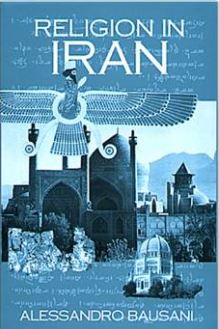
Bausani, Alessandro (b. Rome, 29th May 1921, d. Rome, 11th March, 1988).
A distinghuisghed Islamicist and polymathic scholar and linguist. A Baha'i from around 1955.
See http://www.iranicaonline.org/articles/bausani-alessandro-prolific-italia...
- Persia Religiosa: Da Zaratustra a Bahā’u’llāh. Milan, 1959 =
- Trans. Religion in Iran: From Zoroaster to Baha'u'llah (= Studies in the Babi and Baha'i Religions, V. 11, New York: Bibliotheca Persica, 2000. 455 pp.
- He wrote the entries the entries Bāb, Bābis, Bahāʾ-Allāh, Bahāʾīs, in the 2nd ed. of the Leiden Brill, Encyclopedia of Islam (EI2).
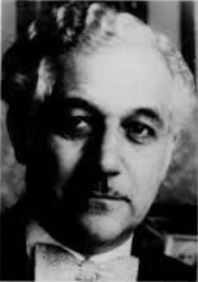

Hasan M. Balyuzi (b. Shiraz, 1908- d. London Feb. 12th 1980). Son of Mírzá `Ali Áqá and Munavvar Khanum.
- Bahá'u'lláh, A Brief Life: The Word Made Flesh. Two long essays on the life of Baha'u'llah, published in conjunction with the Baha'i Centennial. 1963.
- Bahá'u'lláh, King of Glory. Oxford: George Ronald Pub Ltd, 1st ed. 1980. 2nd ed. 1991. 539+5 pp. Completed June 1979.
- Eminent Bahá'ís in the Time of Bahá'u'lláh withsome Historical Background. Oxford: George Ronald Pub Ltd, 1985. 381pp.
Sara, Louisa, Lady Blomfield [Sitarih Khanum] (b. Ireland, 1859 - d. Dec. 31st, 1939). The second wife to architect Sir Arthur Blomfield and a Baha'i from about 1907.
- The Chosen Highway. 1st ed. London: The Baha'i Publishinbg Trust, n.d. x+265 pp. [c.1940]. Oxford: George Ronald Pub Ltd., 1956, 275pp. Many UK and USA reprints. Introduction by Hasan Balyuzi (dated March 1940) and Preface by David Hofman. This work contains important spoken chronicles by Bahiyya Khanum (sister of `Abd al-Baha') and certain of `Abd al-Baha's daughters, including Munirih Khanum and Tuba Khanum. Part II is entitled `Baha'u'llah' and other parts contain valuable historical and biographical materials. "Sara, Lady Blomfield began to take written notes of the spoken chronicles of the ladies of the Family of Bahá'ú'lláh during her first visit to Haifa in 1922."
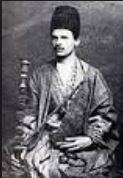
Edward Granville Browne (1862-1926).
Refer : http://www.iranicaonline.org/articles/browne-edward-granville
EGB had a lifelong interest in the life and religion of Sayyid `Ali Muhammad Shirazi (b. Shiraz,1819-d. Tabriz, 1850), the Bab (Gate) as well as the Azali Babi leader, Mirza Yahya Nuri (c. 1830-1913), a half-brother of Baha'-Allah. His many translations from Arabic and Persian, his numerous writings and vast correspondence is, especially in the early years of his post `Year Amongst the Persians', 1887-8 period, often centered on the Bab, his religion or on varieties of the Babi phemonenon. There is yet much that in various ways pertains to Baha'-Allah and his Baha'i followers many of whom were encountered and referred to by Browne as Babis. Browne met both Baha'-Allah and Mirza Yahya on several occasions, wrote pen portraits of them both, and struggled with their conflicting religious teachings and claims. Primarily an academic Persianist he ...
- `The Babis of Persia,” JRAS 21, 1889, pp. 485-526, 881-1009.
- A Traveller's Narrative written to illustrate the Episode of the Báb. [By 'Abd al-Bahā ibn Bahā Allāh.] Edited in the original Persian, and translated into English, with an introduction and explanatory notes, by E.G. Browne. 2 vols. University Press: Cambridge, 1891.
- `Some Remarks on the Babi Texts Edited by Baron Victor Rosen,' JRAS 24, 1892, pp. 259-332.
- `A Catalogue and Description of 27 Babi Manuscripts,' JRAS 24, 1892, pp. 433-99, 637-710.
- “Babiism,” in The Religious Systems of the World, ed., London, ADD 1905
- ERE.
- Materials for the Study of the Babi Religion. Cambridge: Cambrdge University Press, 1918. 380pp. Rep. Cambridge: Cambride University Press, 1961. The first section of this uneven compilation of diverse materials contains historically valuable information about Baha'u'llah written by Muhammad Jawad Qazvini - (who had turned against `Abd al-Baha') = `I. An Epitome of Babi and Baha'i history to A.D. I 898, translated from the original Arabic of Mirza Muhmmad Jawid of Qazwin'. The rest of the book is also worth consulting for scattered historical data pertaining to Baha-Allah, his followers and his writings.
Cole, Juan R.I. Cole (USA.)
- Bahāʾuʾllāh and the Naqshbandī Sufis in Iraq, 1854-1856,” in J. Cole and M. Momen, eds., From Iran East and West: Studies in Bábí and Baháʾí History II, Los Angeles: Kalimat Press, 1984, pp. 1-28.
- `Iranian Millenarianism and Democratic Thought in the Nineteenth Century,' International Journal of Middle East Studies 24 (1992): 1-26.
- BAHĀʾ-ALLĀH(1817-92), MĪRZĀ ḤOSAYN-ʿALĪ NŪRĪ, founder of the Bahai religion or Bahaism.... article in Encyclopedia Iranica, ), vol. III, Fasc. 4 pp. 422-29 (19XX) : http://www.iranicaonline.org/articles/baha-allah Originally Published: December 15, 1988. Last Updated: August 23, 2011
- `A Brief Biography of Baha'u'llah' Juan R.I. Cole, Department of History University of Michigan, 1996. = http://www-personal.umich.edu/~jrcole/bahabio.htm.
Dahaji, Sayyid Mihdi,
- `Risalih,' Cambridge University Library, Cambridge, Browne Collection, Or. F. 57.
Furutan, ʿAlī-Akbar Furūtan (b. Sabzivár, 1905-d. Haifa, Israel, 2003)
= فروتن، على اكبر
- Stories of Bahāʾuʾllāh. Compiled and edited by ʿAlī-Akbar Furūtan ; translated by Katayoon and Robert Crerar with the help of friends. Oxford : Ronald, c. 1986.
Hamadānī, Mīrzā Ḥusayn
- Tārīkh-i Jadīd, ms., Cambridge University Library, Browne Or. F. 55/9.
- Partial trans. Edward G. Browne as The New History of Mīrzā ʿAlī Muḥammed, the Bāb, Cambridge : Cambridge Univ, Press, 1893; repr. Amsterdam: Philo Press, 1975.
Kazemzadeh, K and F. Kazemzadeh,
- “Bahāʾuʾllāh’s Prison Sentence: The Official Account,” World Order 13, Winter 1978-79, pp. 11-13.
Moojan Momen (UK).
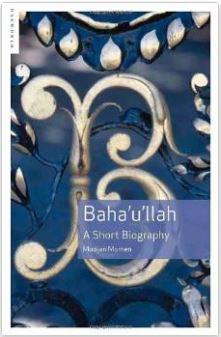
- The Bābī and Bahāʾī Religions, 1844-1944: Some Contemporary Western Accounts, Oxford: George Ronald, 1981.
- Baha'u'llah: A Short Biography. Oxford: Oneworld Publications. 2007. 256 pp.
Oliphant, Laurence (1793–1859), a member of the Scottish landed gentry, traveller, mystic...
Ftrom the 1880s he lived in the German Templar colony in Haifa and in the Druze village of Daliyat al-Karmel on Mount Carmel (20 km. SE of Haifa). Probably met or saw Baha'-Allah.
- Haifa or Life in Modern Palestine. New York.· Harper & Bros., 1887.
Phelps, Myron Henry ( 1856-1916).
- The Life and Tenchings of 'Abbas Effendi Efendi: a study of the religion of the Babis or Baha'is, founded by the Persian Bab and hy his Successors, Baha'u'llah abd 'Abbas Efendi; with an Introduction by Edward G. Browne. G. P. Putnam's Sons, New York and London, 1903 : pp. xliii + 259. Reprint Life and Teachings of Abbas Effendi, New York & London: G.P. Putnam's Sons, 1903, 1904, 1912; University of California Libraries, 1912; McMaster, 2007; Kessinger, 2007, 2008, 2010. See further : https://en.wikipedia.org/wiki/Myron_Henry_Phelps
Mirza Muhammad Jawad Qazvini ( ).
He ultimately became a follower of Mirza Muhammad `Ali, the half-brother of `Abd al-Baha'.
- "An Epitome of Babi and Baha'i History to 1898," trans. in E. G. Browne, ed., Materials for the Study of the Babi Religion Cambridge: Cambridge University Press, 1918.
- Original Persian text or Risala (Treatise, Epitome), Digital facsimile of British Manuscript Project MS No. 749 (2) 4, University of Michigan. East Lansing, Mi.: H-Bahai, 2000, available at : H-Baha'i Website : https://www.h-net.org/~bahai/arabic/vol4/qazvini/qazvini.htm
Ruhe, David S. (1914-d. Newburgh, New York, 2005).
See http://news.bahai.org/story/388
- Door of Hope : The Baha'i Faith in the Holy Land. George Ronald; illustrated edition, 1983. 240pp. Contains valuable material pertaning to Baha'u'llah's later years in western Galilee, in Acre, Bahji, etc.
Salmani, Muhammad-`Ali [the Barber].
- My Memories of Bahá’u’lláh, trans. Marzieh Gail. Los Angeles: Kalimat Press, 1982.
Samandari, Tarazu'llah [Taraz-Allah] (b. Qazvin, 1874 d. [aged 93] Sept. 2nd 1968), son of Kazim Samandar (1844-1918), an Apostle of Baha'-Allah. When aged about 17 this writer was for about 6 months with Baha'-Allah whom he saw several times and experienced revealing sacred verses.

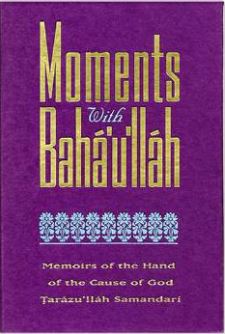
- Moments With Baha'u'llah : Memoirs of the Hand of the Cause of God Tarazu'llah Samandari. Los Angeles: Kalimat Press, 1995. 76pp.
Shoghi Effendi Rabbani (c. 1896- d. London,1957).
- God Passes By. Wilmette, Ill.: Baha'i Publishing Trust, 1970
A history of the first 100 years of the Babi-Baha'i religions by the Guardian of the Baha'i Cause (vali-yi Amr-Allah) :
Taherzadeh, Adib (b. Yazd 1921-d. [Israel] 2000).
The son of the Baha'i teacher and historian Haji Muhammad Tahir-i-Maimiri
This 4 vol. hagiographical overview of the writings of Baha'-Allah contains some important biographical materials and much more besides.
- 1976. The Revelation of Bahá’u’lláh, Volume 1: Baghdad 1853-63. Oxford, UK: George Ronald. http://www.peyman.info/cl/Baha'i/Others/ROB/V1/Cover.html
- 1977. The Revelation of Bahá’u’lláh, Volume 2: Adrianople 1863-68. Oxford, UK: George Ronald.
- 1984. The Revelation of Bahá’u’lláh, Volume 3: ‘Akká, The Early Years 1868-77. Oxford, UK: George Ronald.
- 1987. The Revelation of Bahá’u’lláh, Volume 4: Mazra'ih & Bahji 1877-92. Oxford, UK: George Ronald.
- 1992. The Covenant of Baháʼuʼlláh. Oxford : George Ronald, 1992.

Zarandī, Muhammad, Nabil-i A`ẓam. (d. Acre 1892).
- Tarikh-i Zarandi. The original Persian mss. and recensions of this massive and highly significant compilation of historical, hagiographical and theological/istidlaliyya (Proof text-"testimonia") materials has yet to be published. Only a few excerpts have found their way into diverse Persiante Baha'i related materisls. An edited and rewritten volume drawing creativeloy on materials pertaining to the Bab was translated and published by Shoghi Effendi :
- Ed. Shoghi Effendi, The Dawn-Breakers, Nabil's Narrative of the Early Days of the Baha'i Revelation (1st ed. 1932).
The bulky Persian Tarikh-i Zarandī in a partial English recreated edition and trans;ation by Shoghi Effendi (d.1957), with the title The Dawn-Breakers, Nabil's Narrative of the Early Days of the Baha'i Revelation (1st ed. 1932). This work is a recreation of early Shaykhī and Babi history by the Guardian of the Baha'i religion based upon the huge collection of ms. notes of Zarandī. It opens with two chapter about Shaykhism then the bulk of the book is concerned with the person and religion of the Bab and his followers. Interwoven with these materials are valuable historical and hagiographical insights into the times and person of of Baha'-Allah during the Babi period (1844-1852) and beyond.



